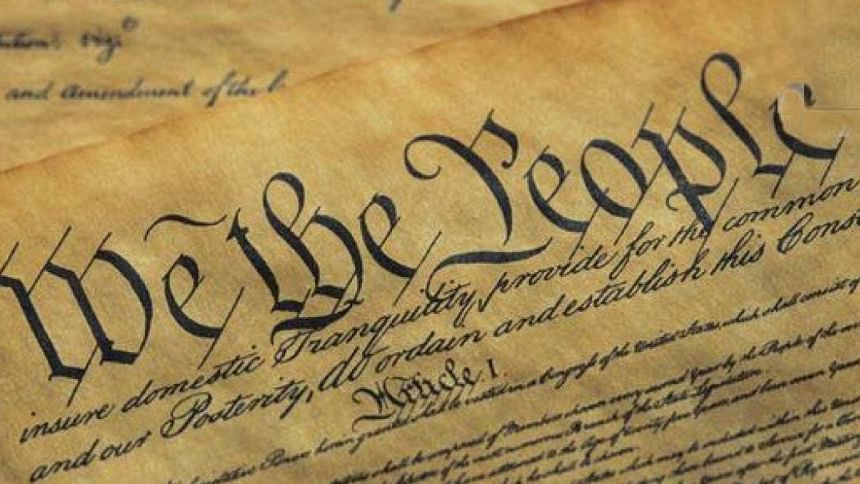A hypothesis test for the future of democracy

In eleven days from today, either Hillary Clinton or Donald Trump is going to be elected the 45th president of the United States. But, for the first time in the American history, a cloud of uncertainty is hanging over the election night since Donald Trump said he would accept the election results only if he won. For the first time, a longstanding American tradition appears threatened. It smacks of a tell-tale sign of trouble in paradise, where democracy has thrived for 240 years on the virtue of voters' choice.
The burden of history might eventually bear upon Donald Trump, and he might change his mind if he loses. It's possible he's only holding everybody in suspense like an amusing prankster, and will do the right thing at the right moment. His party, family and friends might be able to exert influence on him to revise his decision and return to his senses.
But what if Trump chooses to be a dog in the manger? What if he sticks to his determination not to accept defeat in good grace? It'll be an awkward moment for his country, and an embarrassment to its image in the world. Even if finally overcome, this break with tradition might leave a fissure to widen further under growing pressure.
The United States is already seething with tensions. Racial, religious and economic contentions are rife amongst a large segment of the American people manifested in the phenomenal rise of a hatemonger like Donald Trump. Never before in the history of US politics has a contender for the top job in the country banked so much on moral bankruptcy.
It's an irony that the present dynamics of democracy is going bottom up, not top down. That means the best examples of democracy are being influenced by the worst, which should have been the other way around. Most countries of the world are ruled by monarchs, despots and an ersatz of usurpers of power, some a blend of any two or all three.
Autocrats are always the people whose minds are obsessed with superlatives verging on the absurd. For example, the Cambodian media has been instructed to address Prime Minister Hun Sen as Lord Prime Minister and Supreme Military Commander. Hun Sen's wife Bun Rany, who never formally graduated from a university, is addressed as Celebrated Senior Scholar. Ayub Khan of Pakistan and Idi Amin of Uganda were field marshals, although the size of their armies may not have supported their titles. Jean-Bédel Bokassa of Central African Republic decided to convert to Islam one fine morning and proclaimed himself emperor. General Antonio López de Santa Anna, three times dictator of Mexico, held a magnificent funeral for the right leg he had lost in the so-called Pastry War.
Donald Trump has the streaks of an autocrat in him, a deluded mind who sees no wrong in his incessant indiscretions. He has lied, cheated, insulted and groped, a flippant man whose mouth guides his heart. And, nothing sticks to this Teflon man. Not the running list of women, who are accusing him of inappropriate sexual advances. Not the incontinence of tongue that blurs the lines between facts and fictions, decency and denigration. The Republican candidate is a one-man army that ransacks common sense.
But his madness could be the tip of the iceberg. Democracy is undergoing upheaval in its home base as people are often divided over how much concentration of power is safe in their rulers' hands. In Afghanistan, there is growing clamour for the rehabilitation of its bandit king Bacha-i-Saqao, who ruled the country, a century ago, for nine months. In Germany, resurgence of Adolf Hitler is a constant threat, and last January, the publisher of his autobiography Mein Kampf was surprised by the high demand for its reprint.
This month, the Russian city of Oryol unveiled the first ever monument to the 16th-century ruler, Ivan the Terrible. One of the main backers of the monument has argued that strong leaders have coincided with a strong state in Russian history. He cited the example of Alexander II, who freed the serfs and they came to the city and caused a revolution. Again, Gorbachev was weak, as a result of which a great state collapsed.
Thus, Donald Trump is the symptom not the disease. He's a mere aberration from the rectitude, which is suffering from fatigue. People are losing hope in the democratic system in the manner a watchman falls asleep after a strenuous night of vigilance.
The US election on November 8 will be a hypothesis test for democracy. Depending on who wins, it will give a seminal hint on its dynamics. Democracy is safe as long as leaders are looking for strength in their people. But when people are looking for strength in their leaders, it loses steam.
The writer is the Editor of the weekly First News and an opinion writer for The Daily Star.
Email: [email protected]

 For all latest news, follow The Daily Star's Google News channel.
For all latest news, follow The Daily Star's Google News channel. 





Comments